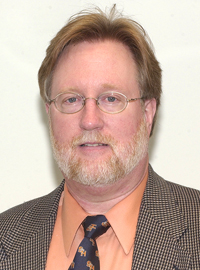Counselor Education Director Recognized for Publications
 |
Richard Watts |
Richard Watts,
director of Sam Houston State University's Center for Research
and Doctoral Studies in Counselor Education, was identified in
a recent study as one of the 20 most prolific authors in counselor
education.
Researchers
Brandon Hunt from Penn State University and Amy Milson from the
University of North Carolina-Greensboro presented their findings
in October at the 2005 national conference of the Association
for Counselor Education and Supervision.
Watts, who received his bachelor's in music education at SHSU
in 1980, worked as a minister for 11 years before getting his
doctorate in counseling. He taught at Kent State in Ohio, before
returning to Texas. He was at Baylor for four years in the Educational
Psychology Department and came to SHSU last summer.
Watts has written more than 70 journal articles and book chapters,
and published five books. A sixth is on the way, but the latest, Adlerian
Therapy , explores one of Watts' greatest interests. It
is the first Adlerian-oriented book published by the American
Psychological Association.
"Adler was a colleague of Freud's," Watts said. "He
used a lot of Freudian language, even though he had a significant
break from Freud in 1911. World War I was really influential
on both Adler and Freud, in different ways.
"Freud
saw the horror of WWI and developed the concept of Thanatos,
or the death instinct," said Watts. "He saw WWI as
indicative of humankind having an innate desire to destroy itself.
"Adler saw the ravages of WWI and said, 'no, it's not that
we're trying to kill ourselves, rather, we have a diminished
level of social interest,'" said Watts. "He coined
the phrase 'Gemeinschaftsgefuhl,' which is translated as 'social
interest' or 'community feeling.'
"What Adler was saying is that we don't have a sufficient
level of feeling of community for our fellow human beings," Watts
said. "The ideas of community and caring for our neighbor
both in an immediate sense and in more of a global sense is very
contemporary.
"Adlerian
therapists place strong emphasis on developing and maintaining
an encouragement-focused therapeutic alliance and tailoring therapy
according to each client's unique needs, circumstances, and expectations," he
said.
Sometimes a
client is very spiritual, and might like to include this aspect
of his life in therapy. Watts feels this is an important new
aspect in counseling.
"I
read and write about the application of the interface between
the client's spirituality and how to use a client's spirituality
to help them," said Watts. "This makes sense, because if you
take a person who's very devout and you don't include that aspect
of the person in their counseling and therapy process, then you
could very well be leaving out of the equation what could be
a strong resource for them. Furthermore, you could be leaving
a family member out, namely God."
If the client is not religious, Watts said, "you don't
bring it up. You don't impose your values on a client. If it's
something the client wants to include in the counseling process,
I say by all means include it--from the client's understanding,
from the client's perspective of religion and spirituality. It's
not an imposition of the counselor's values onto the client."
Though he is
proud of his accomplishments so far, Watts would like to focus
on serving as a mentor for students and less-experienced colleagues.
He explained
that mentoring is a relationship that matures and changes over
time.
"You start off more in a teaching function and then you
move to more of a facilitating function, until you are more like
colleagues. You are serving as more of a resource, walking along
beside them," he said.
Watts serves in various editorial board capacities for professional
journals--including the Journal of Constructivist Psychology ,
the Journal of Counseling and Development , The
Family Journal, and is a member of the board of directors
of the Council for Accreditation of Counseling and Related Education
Programs.
In addition, he is currently president of the Texas Association
for Counselor Education and Supervision.
Watts said he has enjoyed his return to Texas and to the SHSU
campus.
"I really
enjoy being back at Sam," Watts said. "The people I've
met, faculty and students, have been very gracious and encouraging. The
landscape of the campus has changed significantly from when I
was a student in the late 1970s."
—END—
SHSU Media Contact: Kelly
Jakubowski
January 17, 2006
Please send comments, corrections, news tips to Today@Sam.edu.
|


